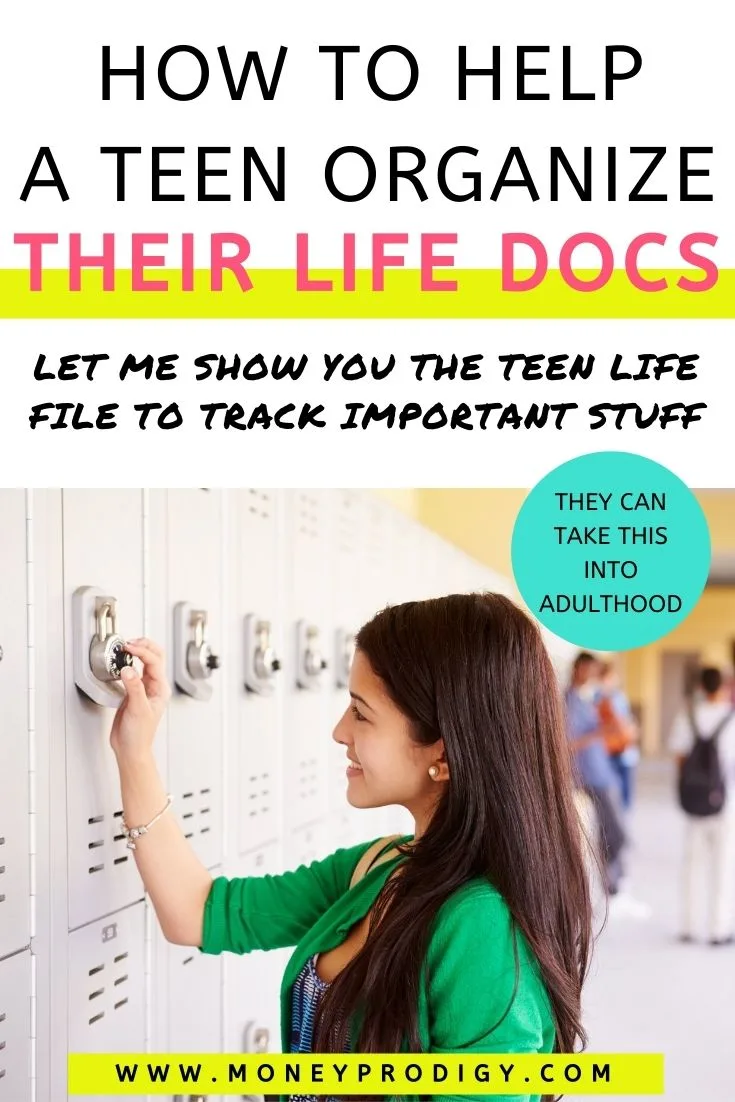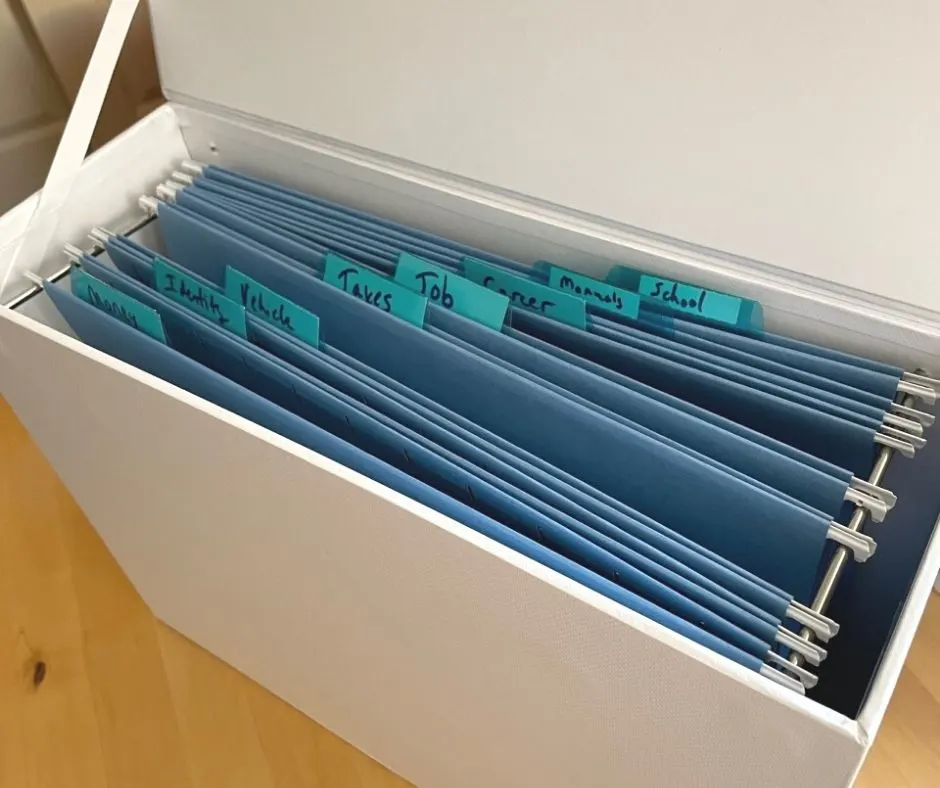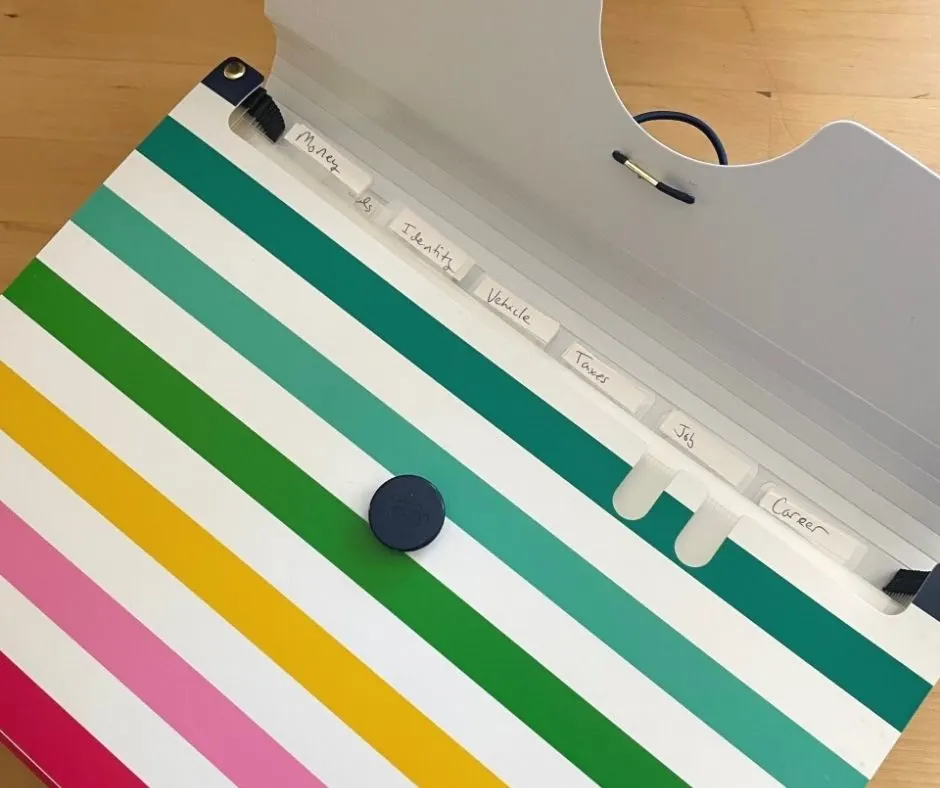As teens age, they collect increasingly important documents to keep track of. Check out the Teen Life File system for how to help a teenager get organized.
How to help a teenager get organized?

Boy am I glad you’re asking this question (plus that I’m in a position to help, now that I'm an adult).
Because one thing I noticed as I became an older teen was all of the important documents beginning to pile up on my dresser, in my car, on my windowsill and in my school folders.
I mean, I had nowhere to put them. Formally, at least, which is why they ended up everywhere.
It was a bit of a rude awakening whenever I had to:
- Apply for a job (where was my resume? Referrals? Working papers?)
- Apply to college (high school transcript? Sealed teacher referral letters?)
- Take my car for an inspection (proof of insurance)
There are so many important documents a teen has to learn to keep track of – and many are financial in nature, or are tied to financial repercussions if you can’t find them.
Granted – today is different from when I was a teen. Many documents are available online, and through apps. Still, there are papers that need to be kept in a place where you can easily access them.
And you and I both know that it only gets worse, as they transition to young adults and have to keep track of even more important documents (like a social security card, high school diploma, and guardianship documents in the event of an emergency).
Not to worry. Today, I’ll show you how to help them create a Teen Life File system – the same one they can take with them into young adulthood.
How to Help a Teenager get Organized
Helping a teen get their important papers organized is partly about setting up a system to organize the documents as they come in, and partly about keeping up that system (hint: they’re much more likely to keep up with a system if it’s established to begin with).
That’s why I’m going over how to set up their Teen Life File System.
Hint: trying to get your teen's whole life organized? You'll also want to check out the things to keep in your wallet – teens, best wallets for teens, and things to keep in your car – teens.
Teen Life File System Setup
Your teen may one day graduate to a full-sized filing cabinet, like I did in my later 20s. But for now, this Teen Life File system will last for all of their teen years (plus into young adulthood).
Here are two different ways to do this system
1. File Box + Hanging Folders

You can purchase a file box, and then add a hanging folder for each of the categories we’re about to go over.
In my opinion, this is the best organizer for high school students because a) it has room to grow with your teen as they transition to adulthood, and b) it’s sturdy.
I got the one in this photo at an Office Depot.
Other great options:
2. Expanding File

Looking for something less formal? You can get an expanding file, and then just fill in the tabs with each category below.
These work great. Just know that your teen will run out of room and will need to establish a filing cabinet system quicker than if you got a roomier file box with hanging folders.
Again, I purchased mine at Office Depot.
Here are some other great options:
File Categories to Use for Teen Life File System
No matter which container you choose, you’ll want to set up these specific tabs.
1. Money – Banking + Money Documents
Does your teen have a checking account with backup checks? A debit card with terms? A savings account? Keep your information for those accounts, debit cards, and anything else “financial” in this folder.
By the age of 16, the FTC recommends you try to pull a teen’s credit report to see if there is one, and any red flags you’ll need to clear up before they need to use their credit in young adulthood (like when looking for a job, getting a college loan, renting first apartment, etc.).
I always keep my annual credit report, then throw it away after getting my next one printed out.
Psst: where do I suggest they keep their budget? In their budget binder. Get your free teen budget worksheet below to learn more.
2. Identity – Identification Documents
Your teen will eventually get a driver’s permit, a driver’s license, and they might have a passport.
I traveled abroad when I was a teen, and it was important that I made photocopies of my passport to keep in a secure location at home, in case I lost mine abroad (so that I could still get the passport number, date of issuance, and date of expiry to reapply at an embassy while abroad).
One day soon, their social security card will be signed over to them.
Their social security card – and number – is super important, as they’ll almost definitely need it for things coming up, like job applications and getting on their own health insurance plan.
Another reason this document is really important to hold onto? While you can get up to 3 replacement ones per year if you lose it, you are only allowed a total of 10 in a lifetime before you have to reapply from scratch (ouch!).
A few things to know:
- Your teen should not carry this card around with them, unless it’s needed for something specific (then they’ll bring it back home, and file it away in a safe location…like the “identification” folder in their Teen Life File system). This is to avoid identity theft, and to avoid having to get it replaced if it gets lost.
- You should not sign the back of the social security card until you get your first job, or until you turn 18. It’s still a valid number without signing it.
That’s why you need a folder for your identification documents.
They can also keep their school IDs in here, and eventually, their birth certificate.
Bonus tip: once your teen turns 18, they can open up their own My Social Security Account, and keep track of their personal earnings and retirement benefits over the years. It’s kind of a fun thing I look at once a year!
3. Vehicle – Car Ownership Documents
With a license and eventual car ownership, comes papers!
Your teen can keep anything car-related in this folder, including things like:
- Car title (while many keep this in their glove compartment, it’s recommended not to do this in case of theft or fire)
- Last year’s registration (current registration should be in the glove compartment)
- Copy of their driver’s license
- Graduation certificate of driver’s ed
- Copy of their insurance information (they'll want to keep their actual insurance proof in their glove compartment)
- Etc.
Psst: does your teen drive? Here's a free printable car accident checklist I created. They can keep it in their glove compartment, along with proof of insurance. Also, here's 11 things to put in your car – teenagers.
4. Taxes
When your child gets their first teen job, they’ll likely need to file for taxes (even if they don’t owe any money).
While it’s extremely unlikely your teen will get audited – I mean, I think they have bigger fish to fry – you should help them build the money habit now of hanging onto a printed copy of their tax returns for 3 years (what the IRS recommends).
They can use this file to collect tax documents throughout the year.
After I file my taxes, I then get a manila envelope, write the tax year on the outside of it with a sharpie, and put all of the documents I used to create the return into this envelope. Then, I put the envelope in the back of my tax folder.
5. Job – Job Search Documents
If searching for a job is not part of your teen’s life yet, then it soon will be.
In this file, they’ll want to stash things like:
- Work papers/employment permits
- Printed confirmation pages from jobs they’ve applied to
- Any typed referrals from previous employers or a teacher
- Blank thank you notes and envelopes, to send a thank you note after an interview
- Etc.
6. Career – Career and Certification Documents
This might be overkill at this stage in their lives, but I’ll mention it anyway. I had (and continue to have) a separate folder from the job search folder for my career.
Why is that?
Simply put – a career is different from a job.
A job is a short-term position, but a career is more of a professional journey, woven together. In my career folder, I keep information articles that inspire me or pique my curiosity about something I want to research, any awards I’ve received, any certifications I’ve received, etc.
7. Manuals – Manuals and Warranties
As your teenager ages, they’re going to own nicer and more expensive items. It’s just a natural occurrence.
For example, when I was 17, I bought my first desktop computer.
You can bet that after saving up and spending my own $856 on it, I wanted to save my manual and warranty on that thing!
Perhaps your teen has a smartphone warranty they can stick in here.
Having a pocket for manuals and warranties is a good idea. If not for now, then for in a few years when they start owning appliances and things that warrant holding onto these things (haha—see what I did there?).
8. School – School Documents
In here, your child can put their eventual diploma, a copy of transcripts, awards they’ve received, etc.
9. Other File Ideas
Those are the 8 different files that I highly recommend creating right now.
Other folders you might consider or that might make sense for your teen:
- Recipes: This is a place to stash treasured recipes, or recipes they’ve practiced with, that they want to take into adulthood.
- Housing: They’ll put their first (and next) rental agreement here, also a dormitory agreement, and eventually, perhaps mortgage documents.
- Hobbies: They can keep sports certificates and team photos in here, and really any paperwork to do with hobbies.
Just think about how much more prepared your teenager is going to be when taking care of their own errands and business issues by getting their Teen Life File system set up now. Trust me – going through this process as soon as possible is going to save a world of headache later, plus set up a great expectation and guidance for them on how to organize their lives.
Amanda L. Grossman
Latest posts by Amanda L. Grossman (see all)
- 50 Banking Activities for Kids (Student Financial Literacy) - February 14, 2024
- 14 Christmas Activities for High School Students (they’ll Actually Find Cool) - December 1, 2023
- 3 Fun Selfie Scavenger Hunts for Teens (Christmas, Fin Lit, etc.) - November 27, 2023
